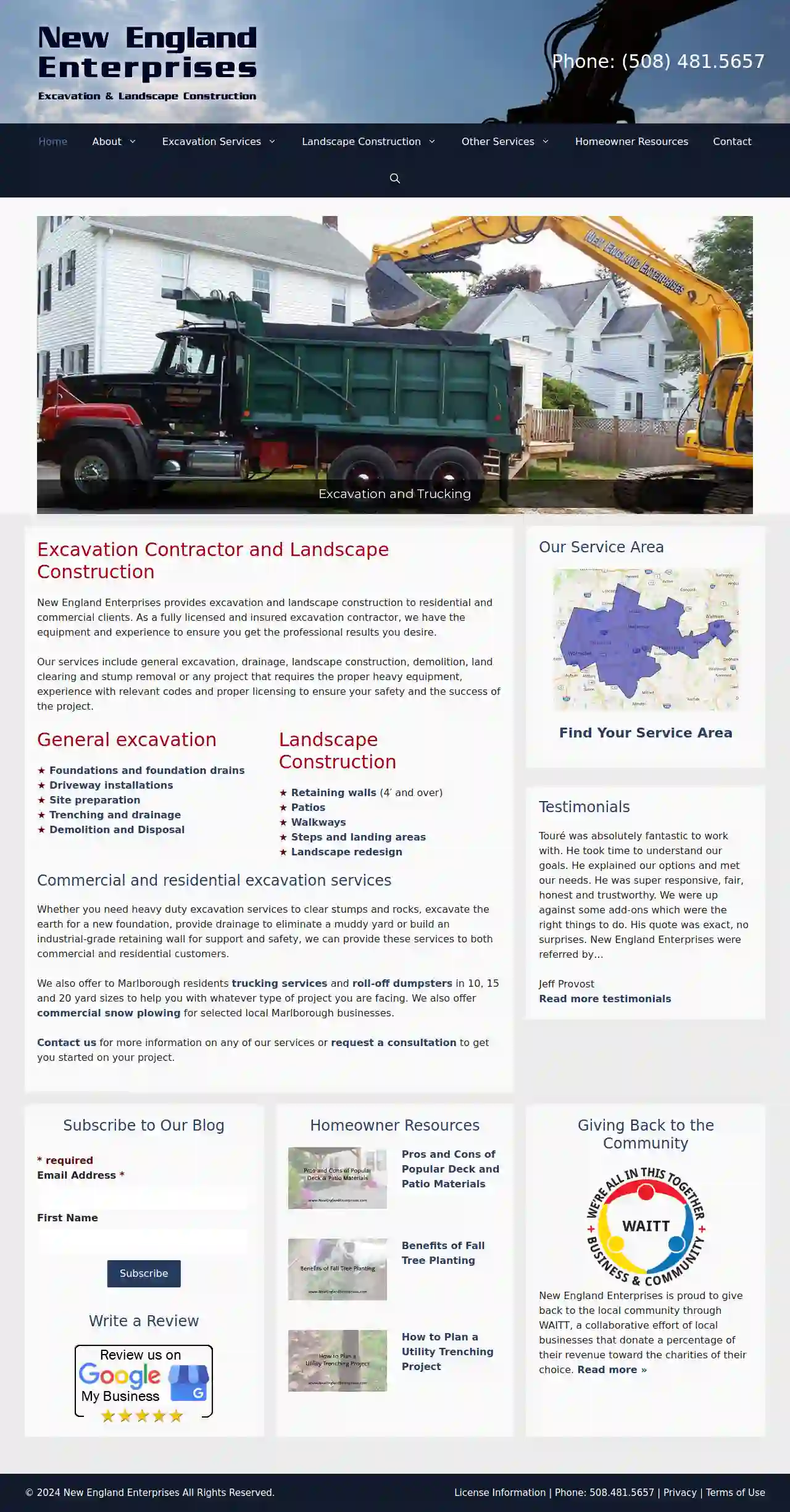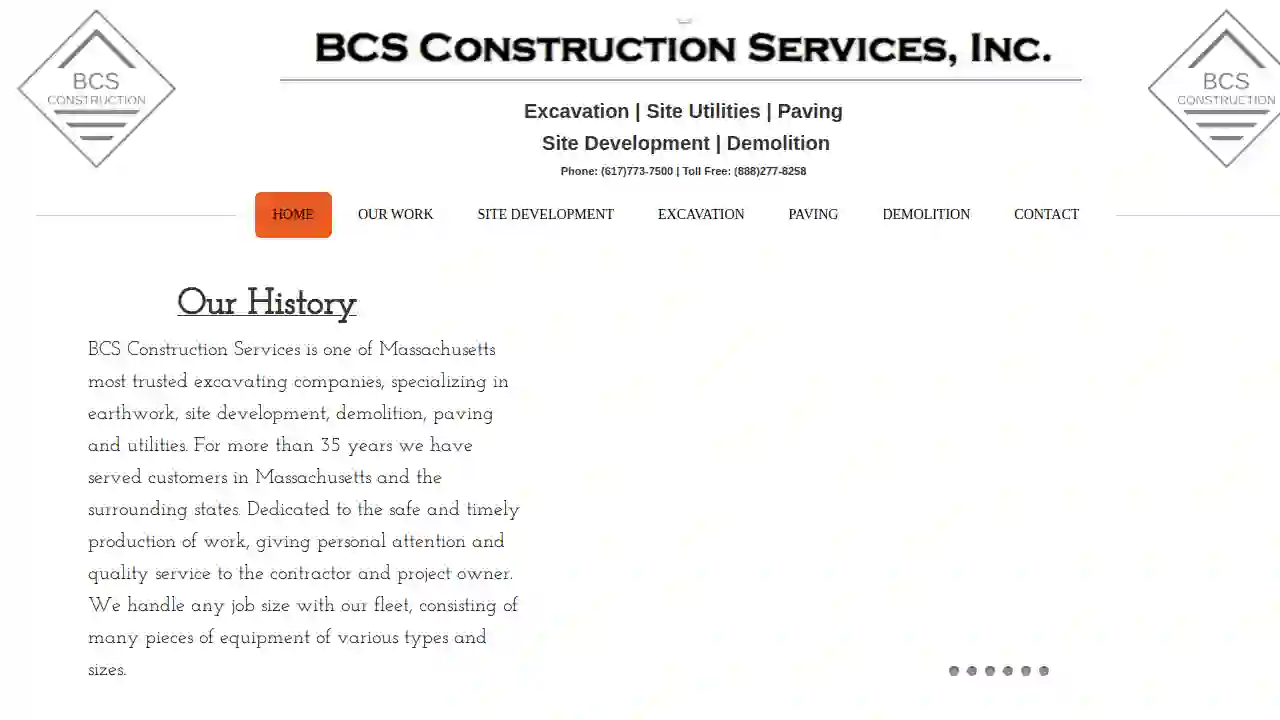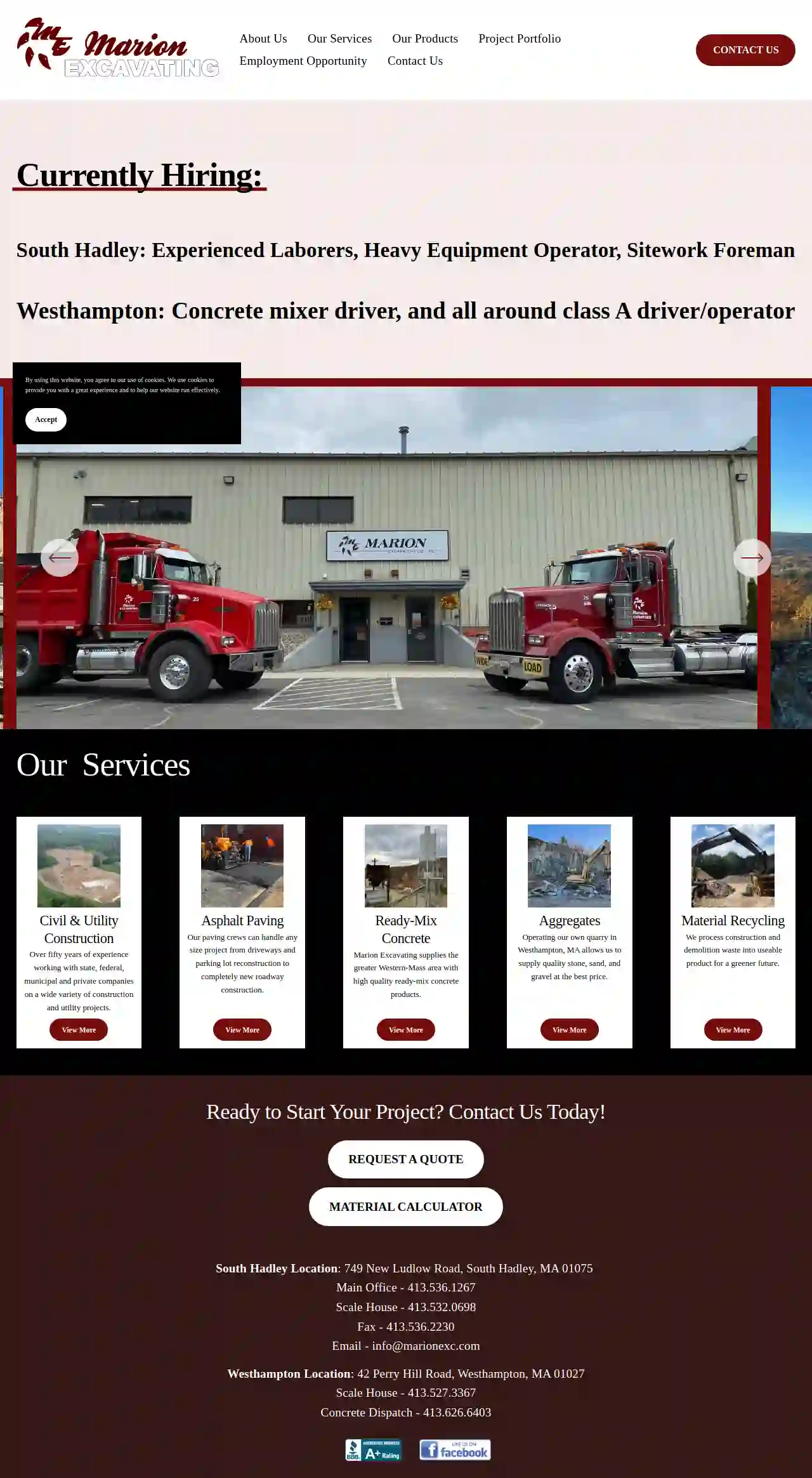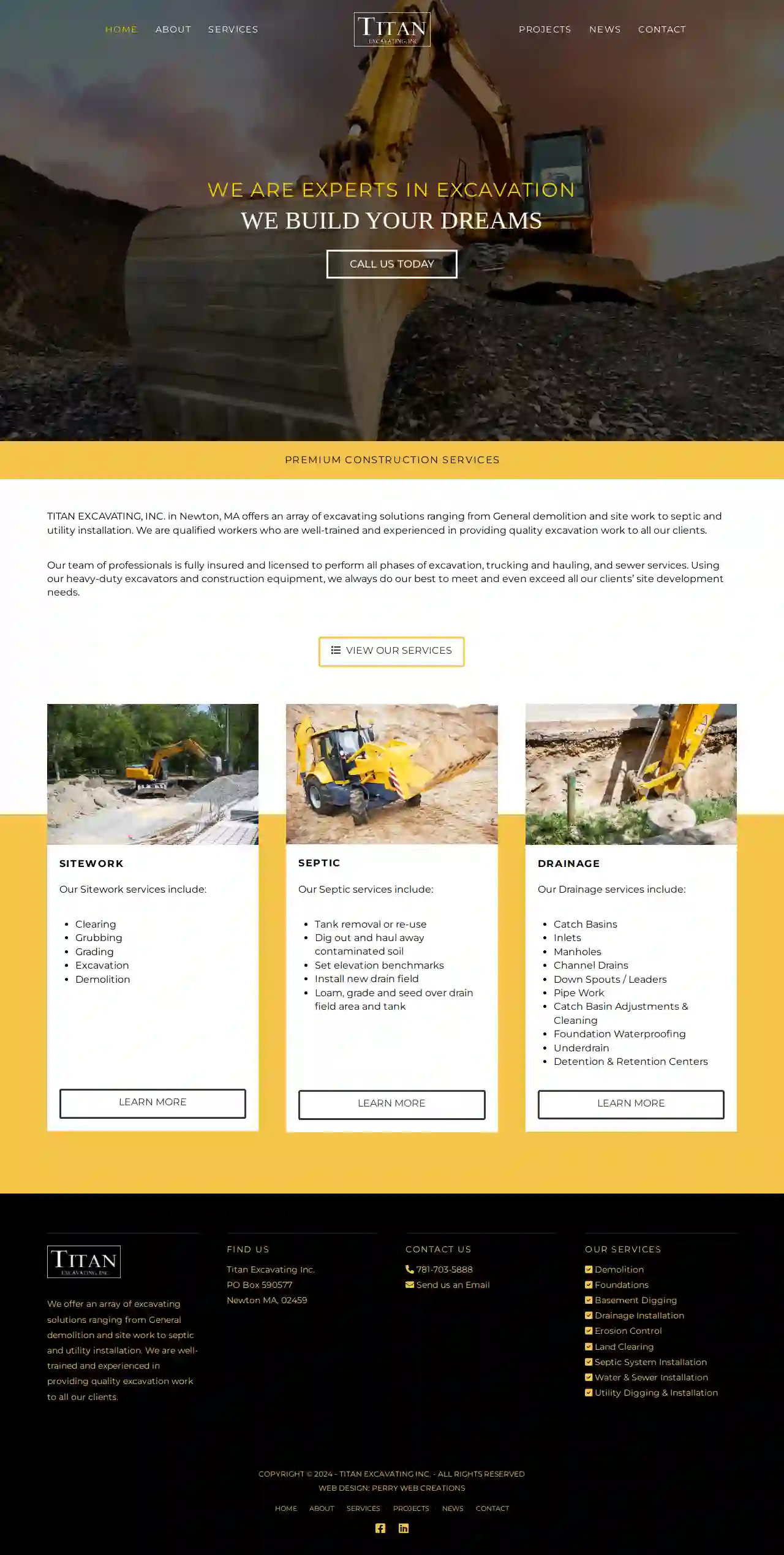Demolition Contractors Marion
Best Demolition Contractors Near Me in Marion
Get 3 FREE Demolition Contractors Near Me quotes for your project today! Compare profiles, reviews, accreditations, portfolio, etc... and choose the best offer.

New England Enterprises
510 reviewsPlymouth, USExcavation Contractor and Landscape Construction New England Enterprises provides excavation and landscape construction to residential and commercial clients. As a fully licensed and insured excavation contractor, we have the equipment and experience to ensure you get the professional results you desire. Our services include general excavation, drainage, landscape construction, demolition, land clearing and stump removal or any project that requires the proper heavy equipment, experience with relevant codes and proper licensing to ensure your safety and the success of the project. Whether you need heavy duty excavation services to clear stumps and rocks, excavate the earth for a new foundation, provide drainage to eliminate a muddy yard or build an industrial-grade retaining wall for support and safety, we can provide these services to both commercial and residential customers. We also offer to Marlborough residents trucking services and roll-off dumpsters in 10, 15 and 20 yard sizes to help you with whatever type of project you are facing. We also offer commercial snow plowing for selected local Marlborough businesses. Contact us for more information on any of our services or request a consultation to get you started on your project.
- Services
- Why Us?
- Testimonials
- Gallery
Get Quote
Boston Contracting Services
859 Willard Street, Suite 400, Quincy, 02169, USBCS Construction Services is a trusted excavating company in Massachusetts, specializing in earthwork, site development, demolition, paving, and utilities. For over 35 years, we've served customers in Massachusetts and surrounding states. We're dedicated to safe and timely work, providing personal attention and quality service to contractors and project owners. We handle any job size with our fleet of diverse equipment. Our Core Focus We specialize in a wide range of services, including: Roads Parking Lots Grading and Compacting Industrial Manhole & Catch Basins Municipal Paving Car Dealerships Demolition Our Services We offer a comprehensive range of services, including: Site Development Excavation Paving Demolition Utilities Licenses & Certifications BCS Construction Services holds various construction and engineering licenses in cities and towns throughout Massachusetts. We are licensed to perform all municipal and commercial work, and we hold licenses to operate interstate when necessary. Our team also holds various safety licenses from OSHA. Insurance & Bonding BCS Construction Services is capable of meeting most insurance requirements for mid to large-size commercial jobs. We also hold various bonds with cities and towns throughout Massachusetts. Other Services BCS Construction Services has provided expert witness testimony to assist in various construction and real estate-related activities. Please contact us directly if you are interested in this service.
- Services
- Why Us?
- Gallery
Get Quote
Consigli Construction Co Inc
4.720 reviews100 Cummings Center, Suite 2200, Beverly, USOur Story A history rooted in tradition, a future led with vision. Learn More > Who We Are A fourth generation company founded in 1905, Consigli offers the strength and stability of a large construction manager and the flexibility of a start-up. Our people love what they do and it shows—in their entrepreneurial spirit, in their desire to create environments that strengthen our communities, in the enduring relationships they build and in the pride they take in their craft. A Legacy Built on Accountability Consigli was founded upon the principles of dedication, hard work and commitment to craft. As we evolve, these things will never change. See the Story > Our People, Our Difference We don’t just assign people to projects—we challenge them to learn, lead, teach, problem-solve and rise to every occasion. Meet the People Who Make It Work > Projects That Move Us It’s our purpose to be builders—it’s ingrained in who we are. We create environments and relationships that strengthen our communities and enrich the ways people live, work, learn, heal and play. Let’s Get to Work >
- Services
- Why Us?
- Gallery
Get Quote
Structure Tone
52 reviewsStamford, USWho We Are We are a family of companies building amazing spaces across the US, Canada, UK and Ireland. History Founded in 1971, we have grown into an organization made up of over 4,700 employees across 54 offices.
- Services
- Why Us?
- Gallery
Get Quote
Marion Excavating Co., Inc.
4.413 reviews749 New Ludlow Road, South Hadley, 01075, USA regional leader since 1968 Servicing Massachusetts & Connecticut Operating since 1968 and incorporated in 1972, Marion Excavating has a long history of serving Western Massachusetts and neighboring areas safely, reliably, on schedule and on budget. Founding brothers Rich, Lee, and Russ Marion launched the business with one backhoe and a truck, quickly gaining a reputation for superior workmanship, safe practices and dependability. Over the years and now in its second generation, Marion Excavating has steadily expanded to meet growing customer demand while delivering the same level of high quality work and value. Fully Equipped, Fully Prepared Today, Marion Excavating takes on a comprehensive range of jobs, both large and small, for commercial, municipal, federal and residential customers. We have a professional staff of over 60 experienced operators, truck drivers and laborers; a large fleet of cutting-edge equipment fitted with the latest GPS technology; A construction recycling & materials facility; Quarry with aggregate processing capability; and a ready-mix concrete plant with delivery service. Marion Excavating is committed to delivering excellent results, which includes high-level environmental awareness and meticulous budget tracking. Contractors across the U.S. rely on our local expertise to fully manage environmentally sensitive projects: asphalt removal and replacement, site development, sewer lines, demolition, storm water management, erosion control and other critical jobs in the region. We have also successfully completed a number of wetland replication projects. Marion Excavating has an excellent track record of securing certification credits for LEED® compliant projects and we are MassDOT prequalified for highway construction, drainage, sewer and water projects.
- Services
- Why Us?
- Gallery
Get Quote
Titan Excavating, Inc
54 reviewsPO Box 590577, Newton, 02459, USTitan Excavating, Inc. - Your Trusted Excavation Experts in Newton, MA Titan Excavating, Inc. is a leading excavation company in Newton, MA, dedicated to providing high-quality excavation services for both residential and commercial clients. We are experts in a wide range of excavation solutions, from general demolition and site work to septic and utility installation. Our team of experienced and qualified professionals is fully insured and licensed to handle all phases of excavation, trucking and hauling, and sewer services. We understand that your project is unique, and we are committed to working closely with you to ensure your vision is realized. We utilize heavy-duty excavators and construction equipment to meet and exceed your site development needs. Our goal is to provide you with exceptional service, competitive pricing, and a commitment to safety and quality. At Titan Excavating, Inc., we pride ourselves on our dedication to customer satisfaction. We believe in building strong relationships with our clients, based on trust, transparency, and open communication. We are committed to providing you with a seamless and stress-free experience from start to finish.
- Services
- Why Us?
- Gallery
Get Quote
Orlando Excavation Corp.
54 reviews155 Main Street, Southborough, 01722, USWelcome to Orlando Construction Corp. We take a personal, customized approach with our customers. We are a renown local excavating contractor based in Southborough, MA with over 20 years of experience. Whether it’s a complete site grading, a new septic install, demolition of a large commercial or residential structure, installation of drainage or catch basins, a large retaining wall, a new asphalt parking lot or driveway or a large hardscape project, we take great care and pride in the work we do for you. We are equipped to meet all your project management needs and are committed to delivering the best in quality, service, safety and reliability our clients expect and deserve. The Right Choice… Renown Industry Leader Honest and Trustworthy Service Over 20 Years Experience Free Consultations Fully Licensed, Insured & Bonded We value our customers and are dedicated to serving you See What Our Clients Are Saying… “I am very pleased with the sitework Orlando Construction helped us with on our house lot! Thanks again to Orlando Construction for the great work and for answering all of our questions and concerns along the way. I will definitely be using Orlando Construction again and will recommend them without hesitation!” – Boxborough, MA
- Services
- Why Us?
- Our Team
- Testimonials
- Gallery
Get Quote
Mass West Construction
Plymouth, USAbout Mass West Inc. Mass West Inc. is a leading provider of high-quality construction services in the [City, State] area. We are committed to delivering exceptional results on every project, no matter the size or complexity. Our team of experienced professionals is dedicated to providing our clients with the highest level of service and expertise. We specialize in a wide range of construction services, including: New construction Remodeling Additions Commercial construction Residential construction We are proud of our reputation for quality workmanship, on-time delivery, and competitive pricing. We are committed to building lasting relationships with our clients and exceeding their expectations on every project.
- Services
- Why Us?
Get Quote
Modern Excavation
41 reviews387 Old Columbia Street, Adams, 01220, USModern Excavation, Inc. Modern Excavation, located in the beautiful Berkshires of Western Massachusetts, services residential as well as commercial customers in all areas of New England. At Modern Excavation you will experience professional work at an honest price, plus ...fast ...friendly ...courteous service. In addition to excavation, we offer many related services throughout the Berkshires, including the southern Berkshire areas of Lenox, Lee, Stockbridge, Becket, Otis, Great Barrington, Sheffield and more. Whether you are a year-round resident of the Berkshires, or a second home owner, we are here to assist you at all levels of service, including excavation, sewer and septic, site work, site & land clearing, waterline replacement, swimming pools, drains, trenching, pool removal, driveways, sand, gravel & top soil, concrete removal, septic system installations and Title V inspections. From simple projects to major repairs, you can count on us for ...Fast ...Friendly ...Courteous Service. Modern Excavation provides a wide range of services to both home owner's and contractors in all areas of New England. We offer Free Estimates and for your convenience we accept MasterCard, VISA and American Express.
- Services
- Why Us?
- Gallery
Get Quote
Deloury Construction Co Inc
4.25 reviews100 Burtt Road, Suite G01, Andover, 01810, USTrusted General Contractor and Excavator in Boston, MA The next time you need help with construction, excavation, or demolition services, count on Deloury Industries. Since 1963, our company has been accomplishing the most demanding construction challenges in the state and across our nation, ensuring our commercial and industrial customers meet the ever-changing demands of the marketplace. Why Choose Us? Our company is founded on the values of honest work, community engagement, and continuous improvement. With these values, strong leadership, and the dedication of our highly skilled employees, we've built on our history of success decade after decade. Moreover, we always aim to exceed your expectations in every project facet and bring life to your developments efficiently, safely, and within budget. Hire Us for Your Next Project Let our team make your project the next challenge we overcome. Our reliable, affordable, and trusted company is always ready to handle any of your construction projects. For inquiries about services, contact us and speak with our general contractor. We hope to be of service to you soon! Be Part of Our Team Jumpstart your career with us, and be part of a company that values its workers. Deloury Industries is now hiring truck drivers. To learn more about our career opportunities, get in touch with us.
- Services
- Why Us?
- Gallery
Get Quote
Over 22,076+ Excavation Contractors registered
Our excavation pros operate in Marion & beyond!
ExcavationHQ has curated and vetted the Best Excavation Companies in and around Marion. Find the most trustworthy pro today.
Frequently Asked Questions About Demolition Contractors
- Clear the Site: Remove all furniture, appliances, personal belongings, and any valuable items from the structure.
- Secure the Perimeter: Fence off the demolition area to prevent unauthorized access and protect surrounding property.
- Disconnect Utilities: Arrange for the disconnection of electricity, gas, water, and other utilities servicing the building.
- Hazardous Material Abatement: If asbestos, lead paint, or other hazardous materials are present, have them professionally removed before demolition begins.
- Notify Neighbors: Inform your neighbors about the demolition schedule to minimize disruptions and address any concerns.
- Obtain Permits: Ensure all necessary demolition permits are in place before starting work.
- Safety: Experienced contractors have the knowledge, skills, and safety training to execute demolitions safely, minimizing risks to workers and surrounding areas.
- Efficiency: Contractors have the specialized equipment and expertise to complete demolitions efficiently, saving time and reducing project costs.
- Compliance: Reputable contractors are familiar with local regulations and permitting requirements, ensuring compliance and avoiding legal issues.
- Waste Management: Contractors have waste management plans to handle debris responsibly, including recycling and proper disposal.
- Liability Protection: Insured contractors protect you from financial responsibility for accidents or damages during the demolition process.
- Permits and Regulations: Obtain all necessary demolition permits and comply with local building codes and environmental regulations.
- Contracts: Have a clear and comprehensive contract with the demolition contractor outlining the scope of work, payment terms, and liabilities.
- Environmental Laws: Comply with environmental laws regarding hazardous material removal, waste disposal, and pollution control.
- Neighboring Property Rights: Respect neighboring property rights and take measures to prevent damage or disruption to adjacent properties.
- Worker Safety: Adhere to worker safety regulations and provide a safe working environment for demolition crews.
How do I prepare my property for demolition?
What are the benefits of hiring a professional demolition contractor?
What is a demolition bond?
What are the legal considerations for demolition projects?
How do I prepare my property for demolition?
- Clear the Site: Remove all furniture, appliances, personal belongings, and any valuable items from the structure.
- Secure the Perimeter: Fence off the demolition area to prevent unauthorized access and protect surrounding property.
- Disconnect Utilities: Arrange for the disconnection of electricity, gas, water, and other utilities servicing the building.
- Hazardous Material Abatement: If asbestos, lead paint, or other hazardous materials are present, have them professionally removed before demolition begins.
- Notify Neighbors: Inform your neighbors about the demolition schedule to minimize disruptions and address any concerns.
- Obtain Permits: Ensure all necessary demolition permits are in place before starting work.
What are the benefits of hiring a professional demolition contractor?
- Safety: Experienced contractors have the knowledge, skills, and safety training to execute demolitions safely, minimizing risks to workers and surrounding areas.
- Efficiency: Contractors have the specialized equipment and expertise to complete demolitions efficiently, saving time and reducing project costs.
- Compliance: Reputable contractors are familiar with local regulations and permitting requirements, ensuring compliance and avoiding legal issues.
- Waste Management: Contractors have waste management plans to handle debris responsibly, including recycling and proper disposal.
- Liability Protection: Insured contractors protect you from financial responsibility for accidents or damages during the demolition process.
What is a demolition bond?
What are the legal considerations for demolition projects?
- Permits and Regulations: Obtain all necessary demolition permits and comply with local building codes and environmental regulations.
- Contracts: Have a clear and comprehensive contract with the demolition contractor outlining the scope of work, payment terms, and liabilities.
- Environmental Laws: Comply with environmental laws regarding hazardous material removal, waste disposal, and pollution control.
- Neighboring Property Rights: Respect neighboring property rights and take measures to prevent damage or disruption to adjacent properties.
- Worker Safety: Adhere to worker safety regulations and provide a safe working environment for demolition crews.